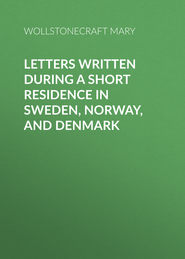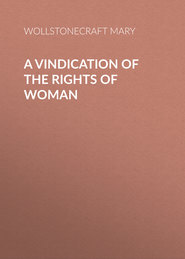По всем вопросам обращайтесь на: info@litportal.ru
(©) 2003-2024.
✖
Mary Wollstonecraft's Original Stories
Настройки чтения
Размер шрифта
Высота строк
Поля
To attain any thing great, a model must be held up to exercise our understanding, and engage our affections. A view of the disinterested goodness of God is therefore calculated to touch us more than can be conceived by a depraved mind. When the love of God is shed abroad in our hearts; true courage will animate our conduct, for nothing can hurt those who trust in Him. If the desire of acting right is ever present with us, if admiration of goodness fills our souls; we may be said to pray constantly. And if we try to do justice to all our fellow-creatures, and even to the brute creation; and assist them as far as we can, we prove whose servants we are, and whose laws we transcribe in our lives.
Never be very anxious, when you pray, what words to use; regulate your thoughts; and recollect that virtue calms the passions, gives clearness to the understanding, and opens it to pleasures that the thoughtless and vicious have not a glimpse of. You must, believe me, be acquainted with God to find peace, to rise superior to worldly temptations. Habitual devotion is of the utmost consequence to our happiness, as what oftenest occupies the thoughts will influence our actions. But, observe what I say, —that devotion is mockery and selfishness, which does not improve our moral character.
Men, of old, prayed to the devil, sacrificed their children to him; and committed every kind of barbarity and impurity. But we who serve a long-suffering God should pity the weakness of our fellow-creatures; we must not beg for mercy and not shew it; – we must not acknowledge that we have offended, without trying to avoid doing so in future. We are to deal with our fellow-creatures as we expect to be dealt with. This is practical prayer! – Those who practise it feel frequently sublime pleasures, and lively hopes animate them in this vale of tears; that seem a foretaste of the felicity they will enjoy, when the understanding is more enlightened, and the affections properly regulated.
To-morrow I will take you to visit the school-mistress of the village, and relate her story, to enforce what I have been saying.
Now you may go and dance one or two dances; and I will join you after I have taken a walk, which I wish to enjoy alone.
CHAPTER XVI
The Benefits arising from Devotion. – The History of the Village School-mistress. – Fatal Effects of Inattention to Expences, in the History of Mr. Lofty.
The next morning Mrs. Mason desired the children to get their work, and draw near the table whilst she related the promised history; and in the afternoon, if the weather be fine, they were to visit the village school-mistress.
Her father, the honourable Mr. Lofty, was the youngest son of a noble family; his education had been liberal, though his fortune was small. His relations, however, seemed determined to push him forward in life, before he disobliged them by marrying the daughter of a country clergyman, an accomplished, sensible woman.
Some time after the birth of his daughter Anna, his elder brother, the Earl of Caermarthen, was reconciled to him; but this reconciliation only led him into expences, which his limited fortune could not bear. Mr. Lofty had a high sense of honour, and rather a profuse turn; he was, beside, a very humane man, and gave away much more than he could afford to give, when his compassion was excited. He never did a mean action; but sometimes an ostentatious pride tarnished the lustre of very splendid ones, made them appear to judicious eyes, more like tinsel, than gold. I will account for it. His first impulse arose from sensibility, and the second from an immoderate desire of human applause: for he seemed not to be alive to devotional feelings, or to have that rock to rest on, which will support a frail being, and give true dignity to a character, though all nature combined to crush it.
Mrs. Lofty was not a shining character – but I will read you a part of a letter, which her daughter, the lady we are to visit, wrote to me.
‘This being the anniversary of the day on which an ever loved, and much revered parent was released from the bondage of mortality, I observe it with particular seriousness, and with gratitude; for her sorrows were great, her trials severe – but her conduct was blameless: yet the world admired her not; her silent, modest virtues, were not formed to attract the notice of the injudicious crowd, and her understanding was not brilliant enough to excite admiration. But she was regardless of the opinion of the world; she sought her reward in the source from whence her virtue was derived – and she found it. – He, who, for wise and merciful purposes, suffered her to be afflicted, supported her under her trials; thereby calling forth the exercise of those virtues with which He had adorned her gentle soul; and imparting to her a degree of heart-felt comfort, which no earthly blessing could afford.’
This amiable parent died when Anna was near eighteen, and left her to the care of her father, whose high spirit she had imbibed. However, the religious principles which her mother had instilled regulated her notions of honour, and so elevated her character, that her heart was regulated by her understanding.
Her father who had insensibly involved himself in debt, after her mother’s death, tried many different schemes of life, all of which, at first wore a promising aspect; but wanting that suppleness of temper, that enables people to rise in the world, his struggles, instead of extricating, sunk him still deeper. Wanting also the support of religion, he became sour, easily irritated, and almost hated a world whose applause he had once eagerly courted. His affairs were at last in such a desperate state, that he was obliged, reluctantly, to accept of an invitation from his brother, who with his wife, a weak fine lady, intended to spend some time on the continent; his daughter was, of course, to be of the party.
The restraint of obligations did not suit his temper, and feeling himself dependent, he imagined every one meant to insult him.
Some sarcasms were thrown out one day by a gentleman, in a large company; they were not personal, yet he took fire. His sore mind was easily hurt, he resented them; and heated by wine, they both said more than their cool reason would have suggested. Mr. Lofty imagined his honour was wounded, and the next morning sent him a challenge – They met – and he killed his antagonist, who, dying, pardoned him, and declared that the sentiments which had given him so much offence, fell from him by accident, and were not levelled at any person.
The dying man lamented, that the thread of a thoughtless life had been so suddenly snapped – the name of his wife and children he could not articulate, when something like a prayer for them escaped his livid lips, and shook his exhausted frame – The blood flowed in a copious stream – vainly did Mr. Lofty endeavour to staunch it – the heart lost its vital nourishment – and the soul escaped as he pressed the hand of his destroyer. – Who, when he found him breathless, ran home, and rushed in a hurry into his own chamber. The dead man’s image haunted his imagination – he started – imagined that he was at his elbow – and shook the hand that had received the dying grasp – yet still it was pressed, and the pressure entered into his very soul – On the table lay two pistols, he caught up one, – and shot himself. – The report alarmed the family – the servants and his daughter, for his brother was not at home, broke open the door, – and she saw the dreadful sight! As there was still some appearance of life, a trembling ray – she supported the body, and sent for assistance. But he soon died in her arms without speaking, before the servant returned with a surgeon.
Horror seized her, another pistol lay charged on the table, she caught it up, but religion held her hand – she knelt down by a dead father, and prayed to a superior one. Her mind grew calmer – yet still she passionately wished she had but heard him speak, or that she had conveyed comfort to his departing spirit – where, where would it find comfort? again she was obliged to have recourse to prayer.
After the death of her father, her aunt treated her as if she were a mere dependent on her bounty; and expected her to be an humble companion in every sense of the word. The visitors took the tone from her ladyship, and numberless were the mortifications she had to bear.
The entrance of a person about business interrupted the narration; but Mrs. Mason promised to resume it after dinner.
CHAPTER XVII
The Benefits arising from Devotion. – The History of the Village School-mistress concluded.
As soon as the cloth was removed, Mrs. Mason concluded the narration; and the girls forgot their fruit whilst they were listening to the sequel.
Anna endured this treatment some years, and had an opportunity of acquiring a knowledge of the world and her own heart. She visited her mother’s father, and would have remained with him; but she determined not to lessen the small pittance which he had anxiously saved out of a scanty income for two other grand-children. She thought continually of her situation, and found, on examining her understanding, that the fashionable circle in which she moved, could not at any rate have afforded her much satisfaction, or even amusement; though the neglect and contempt that she met with rendered her very uncomfortable. She had her father’s spirit of independence, and determined to shake off the galling yoke which she had long struggled with, and try to earn her own subsistence. Her acquaintance expostulated with her, and represented the miseries of poverty, and the mortifications and difficulties that she would have to encounter. Let it be so, she replied, it is much preferable to swelling the train of the proud or vicious great, and despising myself for bearing their impertinence, for eating their bitter bread; – better, indeed, is a dinner of herbs with contentment. My wants are few. When I am my own mistress, the crust I earn will be sweet, and the water that moistens it will not be mingled with tears of sorrow or indignation.
To shorten my story; she came to me, after she had attempted several plans, and requested my advice. She would not accept of any considerable favour, and declared that the greatest would be, to put her in a way of supporting herself, without forfeiting her highly valued independence. I knew not what to advise; but whilst I was debating the matter with myself, I happened to mention, that we were in want of a school-mistress. She eagerly adopted the plan, and persevering in it these last ten years, I find her a most valuable acquisition to our society.
She was formed to shine in the most brilliant circle – yet she relinquished it, and patiently labours to improve the children consigned to her management, and tranquillize her own mind. She succeeds in both.
She lives indeed alone, and has all day only the society of children; yet she enjoys many true pleasures; dependence on God is her support, and devotion her comfort. Her lively affections are therefore changed into a love of virtue and truth: and these exalted speculations have given an uncommon dignity to her manners; for she seems above the world, and its trifling commotions. At her meals, gratitude to Heaven supplies the place of society. She has a tender, social heart, and, as she cannot sweeten her solitary draught, by expressing her good wishes to her fellow-creatures, an ejaculation to Heaven for the welfare of her friends is the substitute. This circumstance I heard her mention to her grandfather, who sometimes visits her.
I will now make some alteration in my dress, for when I visit those who have been reduced from their original place in society by misfortunes, I always attend a little to ceremony; lest too much familiarity should appear like disrespect.
CHAPTER XVIII
Visit to the School-mistress. – True and false Pride.
Their dress was soon adjusted, and the girls plucked flowers to adorn themselves, and a nosegay to present to the school-mistress, whose garden was but small.
They met the children just released from confinement; the swarm came humming round Mrs. Mason, endeavouring to catch her eye, and obtain the notice they were so proud of. The girls made their best courtesies, blushing; and the boys hung down their heads, and kicked up the dust, in scraping a bow of respect.
They found their mistress preparing to drink tea, to refresh herself after the toils of the day; and, with the ease peculiar to well-bred people, she quickly enabled them to partake of it, by giving the tea-board a more sociable appearance.
The harvest-home was soon the subject of conversation, and the harper was mentioned. The family pride of the Welsh, said Anna, has often diverted me; I have frequently heard the inhabitants of a little hut, that could scarcely be distinguished from the pig-sty, which stood in the front of it, boast of their ancestors and despise trade. They have informed me, that one branch of their family built the middle aisle of the church; that another beautified the chancel, and gave the ten commandments, which blaze there in letters of gold. Some rejoice that their forefathers sleep in the most conspicuous tombs – and that their ashes have an inscription to point out where they are returning to their mother earth. And those graves, which only a little stone at the head gives consequence to, are adorned every Sunday with flowers, or ever-greens. We perceive, in all the various customs of men, a desire to live in the past and in the future, if I may be allowed the expression.
Mrs. Mason then observed, that of all the species of pride which carry a man out of himself, family pride was the most beneficial to society. Pride of wealth produces vanity and ostentation; but that of blood seems to inspire high notions of honour, and to banish meanness. Yet it is productive of many ill consequences, the most obvious is, that it renders individuals respectable to the generality, whose merit is only reflected: and sometimes the want of this accidental advantage throws the most shining personal virtues and abilities into obscurity. In weak minds this pride degenerates into the most despicable folly; and the wise will not condescend to accept of fame at second-hand, replied Anna. We ought to be proud of our original, but we should trace it to our Heavenly Father, who breathed into us the breath of life. – We are His children when we try to resemble Him, when we are convinced that truth and goodness must constitute the very essence of the soul; and that the pursuit of them will produce happiness, when the vain distinctions of mortals will fade away, and their pompous escutcheons moulder with more vulgar dust! But remember, my young friends, virtue is immortal; and goodness arises from a quick perception of truth, and actions conformable to the conviction.
Different subjects beguiled the time, till the closing evening admonished them to return home; and they departed reluctantly, filled with respect.
CHAPTER XIX
Charity. – The History of Peggy and her Family. – The Sailor’s Widow.
I have often remarked to you, said Mrs. Mason, one morning, to her pupils, that we are all dependent on each other; and this dependence is wisely ordered by our Heavenly Father, to call forth many virtues, to exercise the best affections of the human heart, and fix them into habits. While we impart pleasure we receive it, and feel the grandeur of our immortal soul, as it is constantly struggling to spread itself into futurity.
Perhaps the greatest pleasure I have ever received, has arisen from the habitual exercise of charity, in its various branches: the view of a distressed object has made me now think of conversing about one branch of it, that of giving alms.
You know Peggy, the young girl whom I wish to have most about my person; I mean, I wish it for her own sake, that I may have an opportunity of improving her mind, and cultivating a good capacity. As to attendance, I never give much trouble to any fellow-creature; for I choose to be independent of caprice and artificial wants; unless indeed, when I am sick; then, I thankfully receive the assistance I would willingly give to others in the same situation. I believe I have not in the world a more faithful friend than Peggy; and her earnest desire to please me gratifies my benevolence, for I always observe with delight the workings of a grateful heart.
I lost a darling child, said Mrs. Mason, smothering a sigh, in the depth of winter – death had before deprived me of her father, and when I lost my child – he died again.
The wintery prospects suiting the temper of my soul, I have sat looking at a wide waste of trackless snow for hours; and the heavy sullen fog, that the feeble rays of the sun could not pierce, gave me back an image of my mind. I was unhappy, and the sight of dead nature accorded with my feelings – for all was dead to me.
As the snow began to melt, I took a walk, and observed the birds hopping about with drooping wings, or mute on the leafless boughs. The mountain, whose sides had lost the snow, looked black; yet still some remained on the summit, and formed a contrast to diversify the dreary prospect.
I walked thoughtfully along, when the appearance of a poor man, who did not beg, struck me very forcibly. His shivering limbs were scarcely sheltered from the cold by the tattered garments that covered him; and he had a sharp, famished look. I stretched out my hand with some relief in it, I would not enquire into the particulars of such obvious distress. The poor wretch caught my hand, and hastily dropping on his knees, thanked me in an extacy, as if he had almost lost sight of hope, and was overcome by the sudden relief. His attitude, for I cannot bear to see a fellow-creature kneel, and eager thanks, oppressed my weak spirits, so that I could not for a moment ask him any more questions; but as soon as I recollected myself, I learned from him the misfortunes that had reduced him to such extreme distress, and he hinted, that I could not easily guess the good I had done. I imagined from this hint that he was meditating his own destruction when I saw him, to spare himself the misery of seeing his infant perish, – starved to death, in every sense of the word.
I will now hasten to the sequel of the account. His wife had lately had a child, she was very ill at the time, and want of proper food, and a defence against the inclemency of the weather, hurried her out of the world. The poor child, Peggy, had sucked in disease and nourishment together, and now even that wretched source had failed – the breast was cold that had afforded the scanty support; and the little innocent smiled, unconscious of its misery. I sent for her, added Mrs. Mason, and her father dying a few years after, she has ever been a favourite charge of mine, and nursing of her, in some measure, dispelled the gloom in which I had been almost lost. – Ah! my children, you know not how many, ‘houseless heads bide the pitiless storm!’
I received soon after a lesson of resignation from a poor woman, who was a practical philosopher.
She had lost her husband, a sailor, and lost his wages also, as she could not prove his death. She came to me to beg some pieces of silk, to make some pin-cushions for the boarders of a neighbouring school. Her lower weeds were patched with different coloured rags; but they spoke not variety of wretchedness, on the contrary, they shewed a mind so content, that want, and bodily pain, did not prevent her thinking of the opinion of casual observers. This woman lost a husband and a child suddenly, and her daily bread was precarious. – I cheered the widow’s heart, and my own was not quite solitary.
But I am growing melancholy, whilst I am only desirous of pointing out to you how very beneficial charity is – because it enables us to find comfort when all our worldly comforts are blighted: besides, when our bowels yearn to our fellow-creatures, we feel that the love of God dwelleth in us – and then we cannot always go on our way sorrowing.
CHAPTER XX










